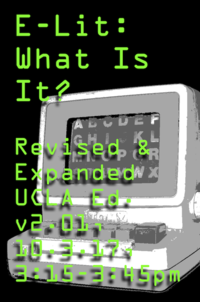Difference between revisions of "E-Lit Wiki"
m (Reverted edits by Thebookworm139 (talk) to last revision by Admin) |
|||
| (11 intermediate revisions by 7 users not shown) | |||
| Line 1: | Line 1: | ||
| − | [[File:Elit_web.png|200px|thumb|right|For further reading, refer to [http://www.lulu.com/shop/ucla-elit/e-lit-what-is-it-revised-expanded-ucla-edition-v201-10317-315-345pm/paperback/product-23358123.html]]][[What]] is [[see also: nothing?|not]] [[electronic]] literature today? Rather than introduce electronic literature or “e-lit” as a [[distinct]] literary [[category]], ELIT WIKI wonders if it’s still possible to consider literature [[beyond]] the electronic circuits that characterize the networked present. The [[creation]] and study of literature today is facilitated by a range of [[digital]] formats and networked [[consoles]], each of which introduce [[new]] [[practices]] of production, circulation, [[reception]], and [[reading]]. Alongside these [[transformations]], this wiki explores a range of new literary genres inhabiting, for example, [[computer]] scripts, image [[macros]], flash movies, social media, [[hypertext]] [[bandcamp]] [[releases]], [[interactive]] applications, and print on demand [[Analysis of Diana Hamilton's Dreams|books]]. Thinking through the present, ELIT WIKI examines the history and future of literature through the everyday experience of computers and electronic devices. From the history of digital poetics to recent [[internet publications]], we track the [[development]] of [[literature]] [[under the influence]] of [[computation]] up to works published in the [[present]], as they emerge online. In lockstep, this wiki considers the category of “electronic literature” as a way to [[think]] about historical works remediated to the internet, in a wide range of [[(post-)]]digital formats. The wiki features short pages in an open format, which may be [[critical]] or [[creative]] in form, [[developed]] in [[conversation]] with the editors. No previous experience in [[programming]], [[poetry]], or literature is [[required]] to read these [[pages]]. | + | [[File:Elit_web.png|200px|thumb|right|For further reading, refer to [http://www.lulu.com/shop/ucla-elit/e-lit-what-is-it-revised-expanded-ucla-edition-v201-10317-315-345pm/paperback/product-23358123.html]]][[What]] is [[see also: nothing?|not]] [[electronic]] literature today? Rather than introduce electronic literature or “e-lit” as a [[distinct]] literary [[category]], ELIT WIKI wonders if it’s still possible to consider literature [[beyond]] the electronic circuits that characterize the networked present. The [[creation]] and study of literature today is facilitated by a range of [[digital]] formats and networked [[consoles]], each of which introduce [[new]] [[practices]] of production, [[circulation]], [[reception]], and [[reading]]. Alongside these [[transformations]], this wiki explores a range of new literary genres inhabiting, for example, [[computer]] scripts, image [[macros]], flash movies, [[social media]], [[hypertext]] [[bandcamp]] [[releases]], [[interactive]] applications, and print on demand [[Analysis of Diana Hamilton's Dreams|books]]. Thinking through the present, ELIT WIKI examines the history and future of literature through the everyday experience of computers and electronic devices. From the history of digital poetics to recent [[internet publications]], we track the [[development]] of [[literature]] [[under the influence]] of [[computation]] up to works published in the [[present]], as they emerge online. In lockstep, this wiki considers the category of “electronic literature” as a way to [[think]] about historical works remediated to the internet, in a wide range of [[(post-)]]digital formats. The wiki features short pages in an open format, which may be [[critical]] or [[creative]] in form, [[developed]] in [[conversation]] with the editors. No previous experience in [[programming]], [[poetry]], or literature is [[required]] to read these [[pages]]. |
== Inspiration == | == Inspiration == | ||
| − | This wiki surveys the development and current state of electronic literature, from the popularity of hypertext fiction in the [[1980's]] to the present, focusing on a [[range]] of emergent genres. It also discusses the central critical [[issues]] raised by electronic literature, pointing out that there is significant overlap with the print tradition. At the same time, the essay argues that the practices, texts, procedures, and processual nature of electronic literature require new critical models and new ways of playing and [[interpreting]] the works. E-Lit WIki is not a systematic attempt to survey and summarize the [[fast]]-changing field of electronic literature, artists, [[designers]], writers, critics—instead, it imagines itself a [[playful]] [[engagement]] with the forms and platforms of the present. (See [http://eliterature.org/pad/elp.html Hayles, 2007])[http://members.cafepress.com/editdesign/111448880] | + | This wiki surveys the development and current state of electronic literature, from the popularity of hypertext fiction in the [[1980's]] to the present, focusing on a [[range]] of emergent genres. It also [[discusses]] the central critical [[issues]] raised by electronic literature, pointing out that there is significant overlap with the [[print tradition]]. At the same time, the essay argues that the practices, texts, procedures, and processual nature of electronic literature require new critical [[models]] and new ways of [[playing]] and [[interpreting]] the works. E-Lit WIki is not a systematic attempt to [[survey]] and summarize the [[fast]]-changing field of electronic literature, artists, [[designers]], writers, critics—instead, it imagines itself a [[playful]] [[engagement]] with the forms and [[platforms]] of the present. (See [http://eliterature.org/pad/elp.html Hayles, 2007])[http://members.cafepress.com/editdesign/111448880] |
== See Also == | == See Also == | ||
Latest revision as of 17:13, 15 January 2018

Inspiration[edit]
This wiki surveys the development and current state of electronic literature, from the popularity of hypertext fiction in the 1980's to the present, focusing on a range of emergent genres. It also discusses the central critical issues raised by electronic literature, pointing out that there is significant overlap with the print tradition. At the same time, the essay argues that the practices, texts, procedures, and processual nature of electronic literature require new critical models and new ways of playing and interpreting the works. E-Lit WIki is not a systematic attempt to survey and summarize the fast-changing field of electronic literature, artists, designers, writers, critics—instead, it imagines itself a playful engagement with the forms and platforms of the present. (See Hayles, 2007)[2]